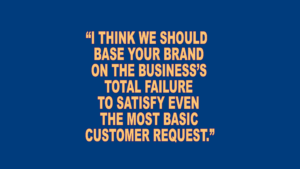I love a good brand model.
I have my own pet theories: behaviour drives attitude, vision before values, HR is not the enemy.
Crazy stuff.
I spend my life desperately trying to uncover pot of gold at the end of the research results.
Or create a movement from a string of four specifically selected words.
Or find the insight that will double sales while halving spend.
It keeps me off the streets.
And, as much as I love me a good brand model, so often the inputs ignore the ugly side of a business.
Not the bad side of a business.
I’m not suggesting for a moment we should be having conversations like, “Barry. I think we should base your brand on your business’s total failure to satisfy even the most basic customer requests.”
I’m talking the ugly side of the business.
Like profit.
We very rarely hear profit mentioned as a value.
Not just a fair profit. Profit enough to continue trading. Profit enough to keep our people in a job. We don’t mention money at all.
It’s like money is the attractive idiot in a family of supermodel savants.
Appreciated. But never boasted about.
Values are important. Values are what great brands are built on.
Customer service. A commitment to excellence. Transparency. Honesty. Truth. Justice.
But hardly ever any mention of money.
Do we not value that thing which keeps the wheels of the business lubricated?
Is it because we assume it’s crass to talk of money?
Or do we believe our customers don’t want us to mention profit as a value because they will then assume we’ll put money before people?
As brand gurus and football coaches will tell you, our values should be those things we are not prepared to compromise on.
The ideas at the core of how we act and what we say.
The bedrock of the reputation we have, and the reputation we want.
They are the ideals by which we judge our actions.
If we truly want to merge the actions of our people with the expectations of our customers, should we not consider all those things all our people aspire to?
Do we not mention cash because “brand” represent our ideals – and “business” represents a more prosaic reality.
Perhaps this is why marketing is so often seen as an adjunct to a business, and not a core pillar.
We should be more open to merging the timeless business truths with timeless human truths.


Leave A Comment